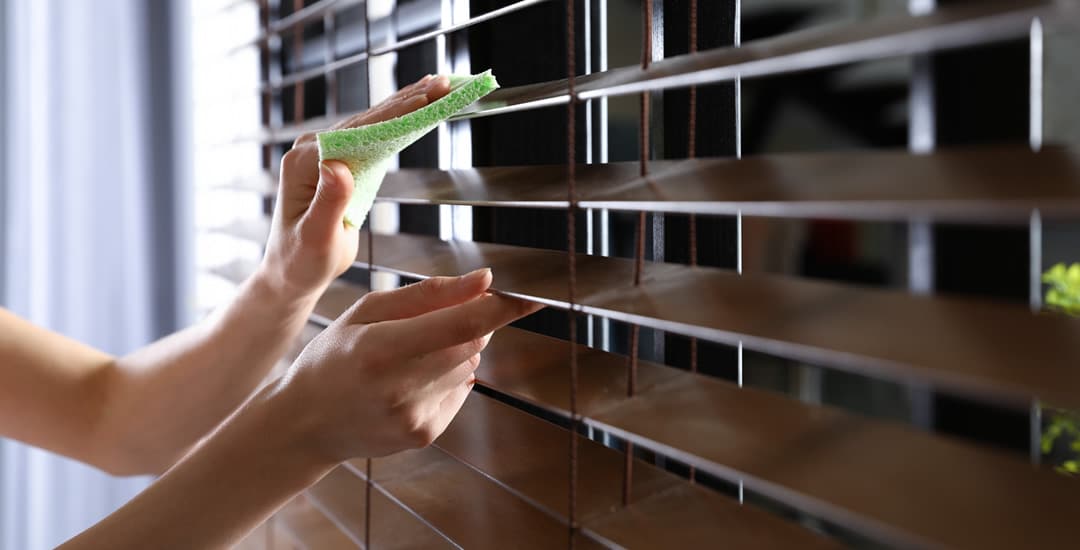
How often should you clean blinds? Man, I am not the best person to advise on good practice regarding cleaning, according to my mother anyway. For this reason, my default, smart-arse answer is “as often as they get dirty,” but also, my tiny and usually ignored Good Voice that is concerned about how we’d keep ourselves in wine and unsuitable footwear if we lost our job, is suggesting that I consider this subject with a little more gravitas.
So, how often should you clean blinds? For most applications, once every week or two, and this should take less than a minute for most blinds. I suggest dusting your blinds semi-regularly whether they look dusty or not, because if you do this, it will almost certainly negate the need for anything more rigorous or complicated down the line for blinds in most rooms of the house.
However, when it comes to blinds in kitchens and potentially bathrooms, you might need to give them a more thorough going over every now and then too.
This blog post will talk about how often window blinds should be cleaned based on their type and usage, and why.
How often should you clean blinds in “dry” rooms to keep them in good condition?
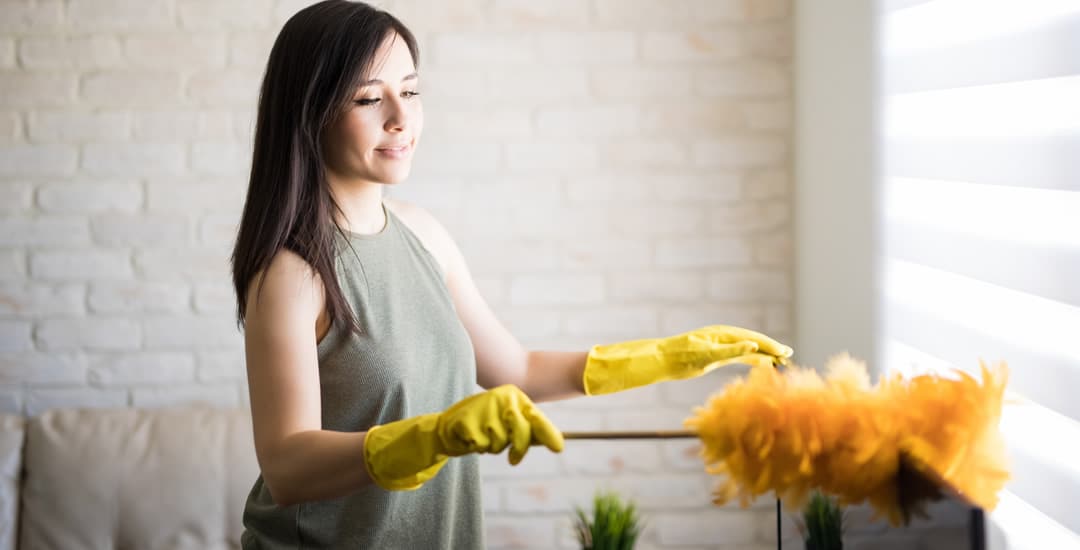
For rooms like the lounge, dining room, bedrooms, home office, and basically all other rooms that aren’t the kitchen or bathroom, just dusting them once every week or two is likely to be absolutely sufficient forever. ** There is one exception to this, which I will cover in the very last section. **
Assuming that you do this, you will probably never need to clean blinds with water or in a more serious manner than can be achieved with a duster.
How often do you need to clean your blinds to keep them functioning properly?
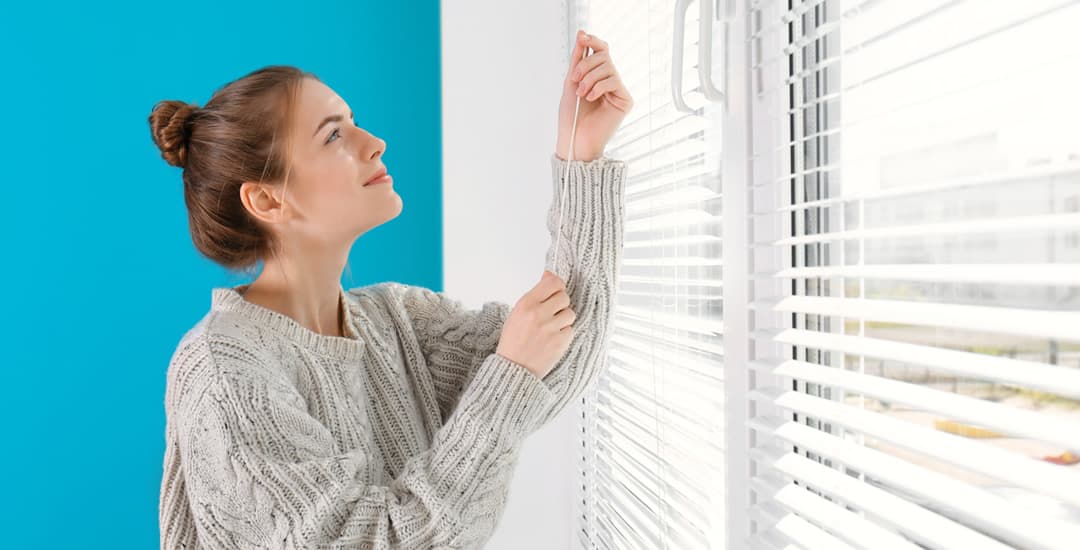
I suggest cleaning (or rather, dusting) your blinds in “dry” rooms once every 7-14 days not only to prevent them from getting dusty and starting to look grubby, but also to keep them in good working order.
This is particularly important if your blinds are always or often left in one position, i.e., open or closed or with the slats always angled in the same arrangement.
If you don’t open and close your blinds regularly as part of everyday life, I suggest you make a special effort to go and do this once a week or so, to ensure that dirt/dust and so on doesn’t eventually fur up their operating mechanism and start causing functional problems. Have at them with a duster when you’ve done this, and the whole process will be over in about 60 seconds.
How often should you clean blinds in kitchens?
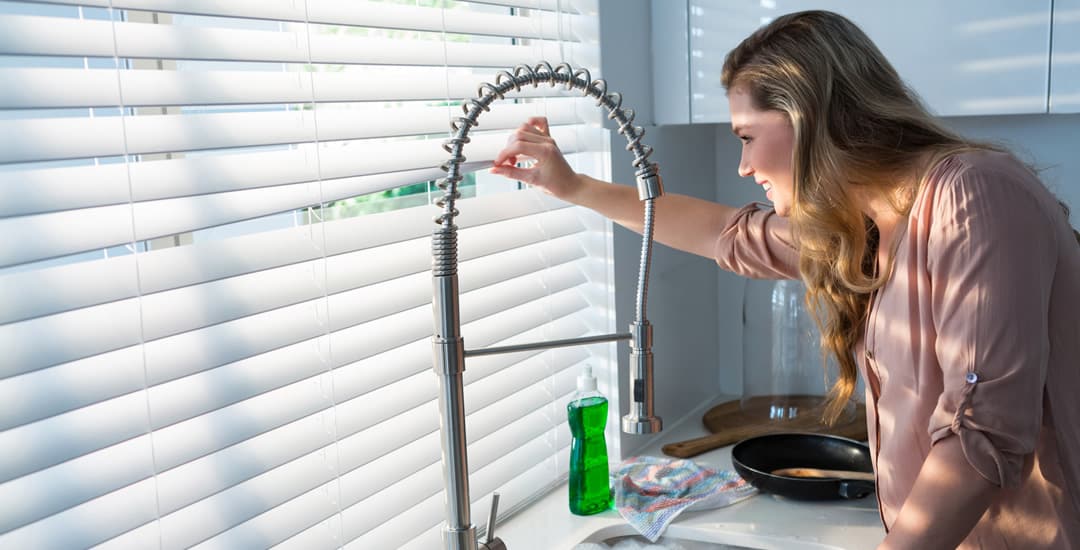
This sort of depends on the challenges your blinds face. Blinds for kitchens tend to be exposed to humidity and also potentially cooking fat vapour in the air, both of which also encourage dust to settle on the blind. This is particularly likely to become icky and annoying if your family are big into fried chips, as the blind will begin to develop a dirty, greasy film after a while, which dusting most certainly will not resolve and may well worsen.
Blinds in kitchens should be waterproof, because they tend to get exposed to humidity and fat vapour and also, to allow you to clean them of grease, dust, and any food debris safely and easily.
This may never become an issue; for some kitchens and how they’re used, just dusting once every week or two will be sufficient.
But if your blind does tend to get dust sticking to it and/or a film of cooking fat developing on it, I would suggest giving it a good wipe down with a damp cloth and a mild washing up liquid every two to four weeks, to prevent a really tacky film from forming on it and causing you to need to spend potentially a lot longer getting rid of it.
How often should you clean blinds in bathrooms?
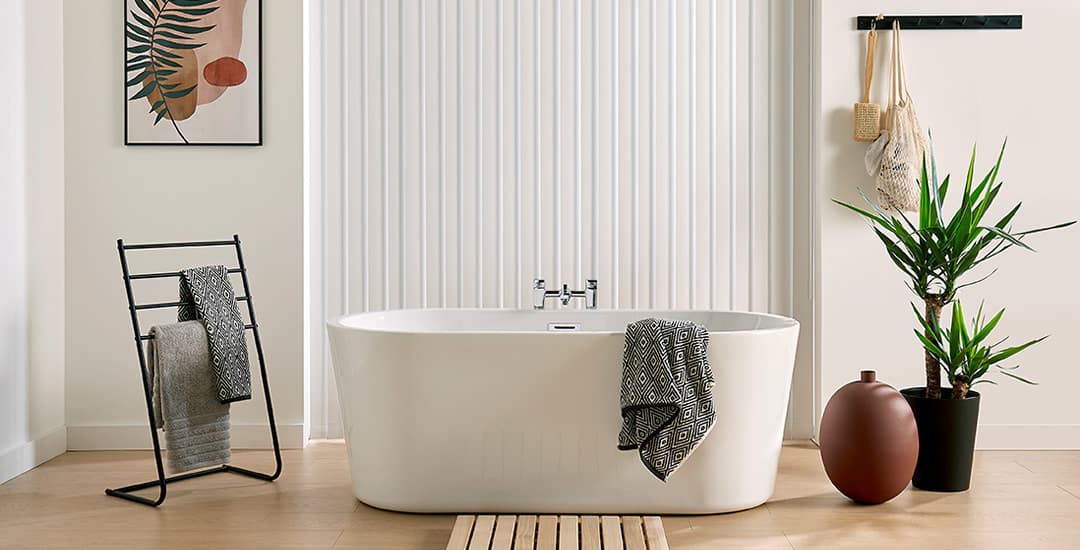
The humidity in bathrooms can result in dust sticking to the blind more than it would in “dry” rooms, much as can happen in kitchens. However, cooking fat and grease don’t tend to be a big issue for bathroom blinds… Which is excellent news on the “not a fan of cleaning” front.
With this in mind, I suggest that whenever you do your general bathroom cleaning of the sink, shower and so on, you do the blinds as well. Once a week if you’re the benchmark of good standards? Once a fortnight if you’re me? (In my defence, I do spend a couple of nights a week away from home).
Or even longer if you’re even grosser, because if the state of your washing facilities aren’t offending your sensibilities yet, the dust on the blind probably won’t be either.
However, even if you are Stig of the Dump and don’t clean your bathroom as often as your mother would approve of, I still suggest giving the blind a dust off (assuming it is dry) or a wipe off every couple of weeks anyway, to ensure that the operating mechanisms don’t start to fur up, as mentioned earlier on for regular blinds.
How often do you need to clean your blinds if you suffer from allergies?
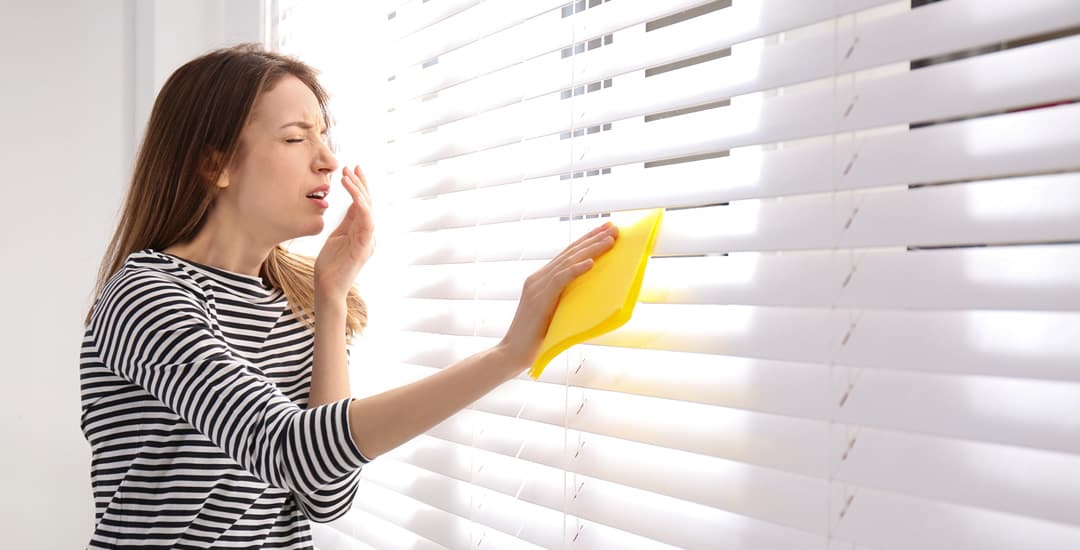
If you suffer from allergies to any meaningful extent; first of all, I’m very sorry. I turn into a very unpleasant person for the four or five days every other year when I get something that might politely be referred to as as very mild form of hayfever, and for those of you that find that your allergies manifest acutely or even dangerously, I can imagine that this really does ruin your life on the regular.
People who are sensitive to airborne allergens like pollens, pets, and so on usually have a fairly heavy-duty cleaning regime in place to minimise their impact; air purifiers, the use of hypoallergenic fabrics where fabrics cannot be avoided altogether, and the type of cleaning routine that would possibly make me actually cry.
This means then that you probably don’t need me to tell you that keeping your blind clean or dust-free is a small but important part of helping to keep your allergies under control; but dusting might be a counterintuitive approach to this.
My suggestion for cleaning blinds if you or someone you live with has allergies is to choose waterproof blinds for every room of the house.
This is so that they don’t trap and harbour allergenic particles, and because you can wipe them off with a damp cloth and dispose of/wash this with any potential allergens trapped on the cloth, rather than dry-dusting the blind and freeing all of those allergens back into the environment.
How often should you clean blinds if you want to reduce allergens, then? I suggest that you follow the sort of cleaning frequency that you employ in general to manage your allergies. When you wipe off or clean things like tables and so on with a view to removing environmental allergens, include the blinds too.
If you have acute, frequent, or almost permanent allergy symptoms, this might mean doing this every couple of days. For most people though, cleaning your blinds at least once a week should help to ensure they don’t harbour allergens.
How often do you need to clean your blinds if you smoke in the house?

Finally then! Smoking tobacco products is banned in all public indoor spaces and many outdoor ones these days; and this means that if you are a smoker, there’s perhaps a higher chance now than ever that you smoke in at least one room of the home (during the colder months of the year anyway) simply because your options are so limited.
With this in mind, how often do you need to clean your blinds if you smoke? There’s no hard and fast rule here, because how heavily you smoke and how well ventilated the room is (and as is the case for bathrooms, how gross things start to look before you feel incentivised to deal with them) varies from case to case.
Nicotine will form a yellow film on blinds over time, which itself looks rank and also may get further gummed up by dust; it will also contribute to the stale smoke smell in the room too. Dusting won’t do anything at all for this either, and so this is the exception that I referred to regarding “dry” rooms earlier on.
This means that however often you feel the need to clean your blind to get rid of nicotine residue, you’re going to need to wash/wipe it rather than dusting it.
For this reason, I suggest choosing waterproof blinds for a room that someone smokes in to make this easier and more effective; and because waterproof blinds are far less prone to becoming imbued with Eau de Rothmans than porous/non-waterproof fabric blinds too.




